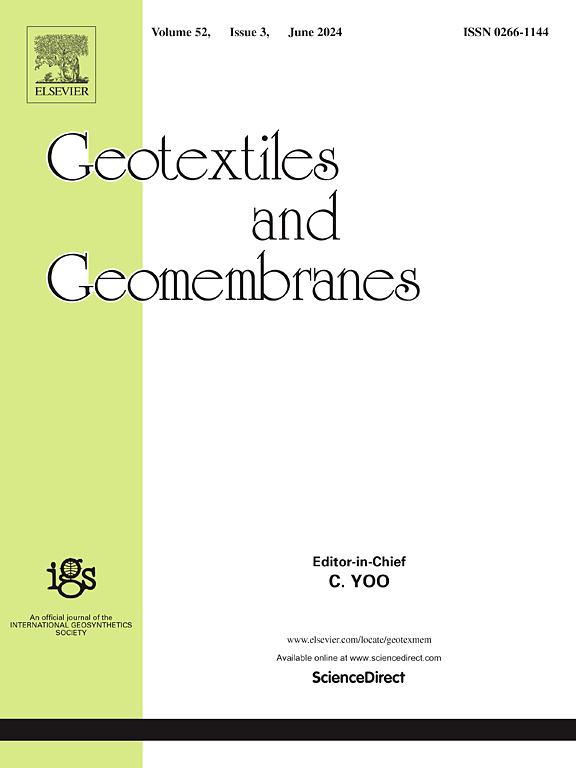自重和底部真空预压下建筑垃圾泥浆固结效果的大尺寸模型试验研究
IF 6.2
1区 工程技术
Q1 ENGINEERING, GEOLOGICAL
引用次数: 0
摘要
底部真空预压(BVP)是在土壤底部区域施加真空压力,使上下边界产生孔隙水压力差,从而实现固结排水的方法。本研究通过大尺寸模型试验,探讨了自重与 BVP 结合处理建筑垃圾泥浆(CWS)的工程可行性。通过自重固结(0-26 d)和覆水 BVP(26-78 d)措施的处理,CWS 的平均含水率从 255.6% 降至 115.9%,体积减少比达到 0.476。但是,由于这两种措施只能对底部的 CWS 进行适当处理,为了进一步降低靠近上部区域的 CWS 含水量,还采取了带泥浆覆盖的 BVP(78-141 d)和自然风干(141-434 d)措施。后两个阶段的措施将 CWS 的平均含水量降至 84.9%,并将体积减少率提高到 0.581。此外,测量结果表明,经过处理的 CWS 大多具有 10 kPa 或更高的剪切强度。总体而言,所建议的方法在处理 CWS 方面具有一定的工程可行性,所进行的试验研究可为 CWS 的实际处理提供参考。本文章由计算机程序翻译,如有差异,请以英文原文为准。
A large-size model test study on the consolidation effect of construction waste slurry under self-weight and bottom vacuum preloading
Bottom vacuum preloading (BVP) is the method of applying vacuum pressure at the bottom zone of soils to generate pore-water pressure difference between the top and bottom boundaries, thereby achieving the consolidation drainage. This study conducted a large-size model test to explore the engineering feasibility of combining self-weight and BVP to treat construction waste slurry (CWS). Through the treatment of the measures of self-weight consolidation (0–26 d) and BVP with a water cover (26–78 d), the average water content of CWS declined from 255.6% to 115.9%, and the volume reduction ratio reached 0.476. However, since these two measures could properly treat only the bottom CWS, the measures of BVP with the mud cover (78–141 d) and the natural air-drying (141–434 d) were performed to further decrease the CWS water content near the upper zone. The latter two-stage measures reduced the average water content of CWS to 84.9% and increased the volume reduction ratio to 0.581. Moreover, the measurements suggested that the treated CWS largely exhibited a shear strength of 10 kPa or more. Overall, the proposed approach appeared some engineering feasibility to treat CWS, and the performed test study could act as a reference for the practical treatment of CWS.
求助全文
通过发布文献求助,成功后即可免费获取论文全文。
去求助
来源期刊

Geotextiles and Geomembranes
地学-地球科学综合
CiteScore
9.50
自引率
21.20%
发文量
111
审稿时长
59 days
期刊介绍:
The range of products and their applications has expanded rapidly over the last decade with geotextiles and geomembranes being specified world wide. This rapid growth is paralleled by a virtual explosion of technology. Current reference books and even manufacturers' sponsored publications tend to date very quickly and the need for a vehicle to bring together and discuss the growing body of technology now available has become evident.
Geotextiles and Geomembranes fills this need and provides a forum for the dissemination of information amongst research workers, designers, users and manufacturers. By providing a growing fund of information the journal increases general awareness, prompts further research and assists in the establishment of international codes and regulations.
 求助内容:
求助内容: 应助结果提醒方式:
应助结果提醒方式:


